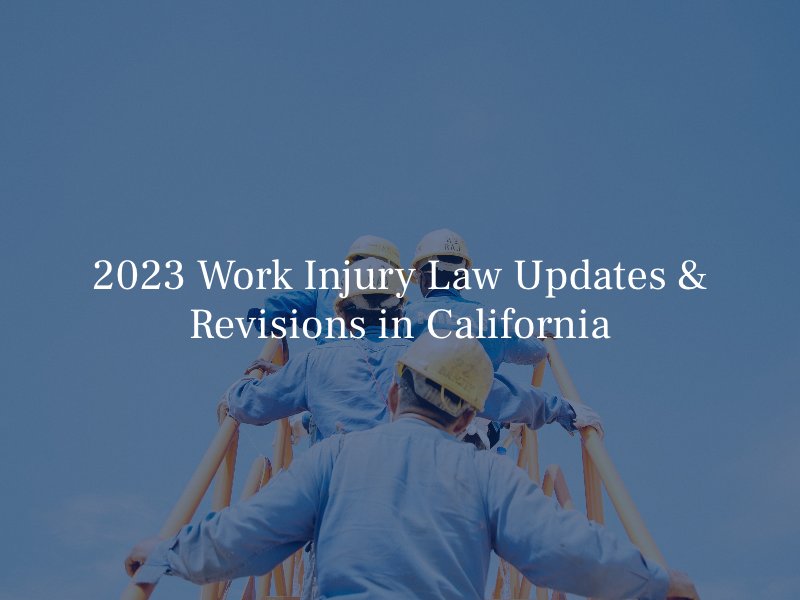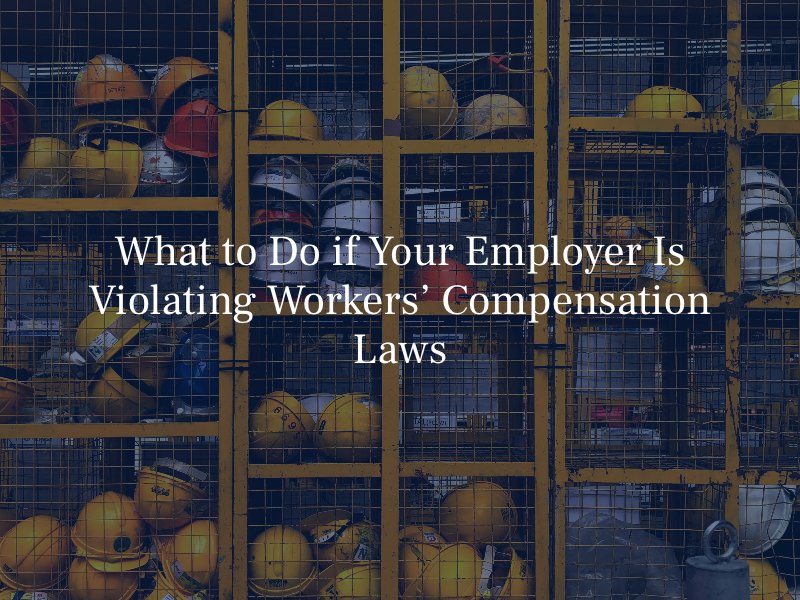2023 Work Injury Law Updates & Revisions in California
June 20, 2023 Posted In Work-related injury
In California, work injury laws undergo regular updates and revisions to ensure that injured workers are provided with adequate protection, benefits, and rights. These changes reflect the evolving needs of the workforce and aim to improve the efficiency and fairness of the workers’ compensation system. Here are some recent changes in the state’s work injury laws.

Increased Benefits
Temporary Total Disability (TTD) refers to a type of workers’ compensation benefit that provides wage replacement payments to employees who are unable to work due to a work-related injury or illness. To address the financial concerns of injured workers, California has periodically adjusted the minimum and maximum temporary disability rates. TTD benefits are generally paid at a rate of two-thirds (66.67%) of the worker’s average weekly wage, subject to certain maximum and minimum limits set by law. In 2023, The maximum weekly benefit for TTD increased from $1,539.71 to $1,619.15 and the minimum from $230.95 to $242.86. These benefits are tax-free and continue until the employee reaches a point of maximum medical improvement or is deemed able to return to work.
Definition of a “Serious Injury”
Serious injury or illness is now defined as follows:
Labor Code § 6302(h) “Serious injury or illness” means any injury or illness occurring in a place of employment or in connection with any employment that requires inpatient hospitalization, for other than medical observation or diagnostic testing, or in which an employee suffers an amputation, the loss of an eye, or any serious degree of permanent disfigurement, but does not include any injury or illness or death caused by an accident on a public street or highway, unless the accident occurred in a construction zone.
California revised the definition of “serious injury or illness” for purposes of Cal/OSHA reporting by:
- Eliminating the 24-hour minimum time requirement for qualifying hospitalizations.
- Excluding hospitalizations for medical observation or diagnostic testing.
- Including the loss of an eye as a qualifying “serious” injury.
- Removing “loss of a body member” and, instead, including amputation.
- Eliminating the exclusion of injury or illness caused by certain violations of the Penal Code.
- Narrowing the exclusion of injuries caused by accidents occurring on a public street or highway to include those injuries or illnesses occurring in a construction zone.
Extension of Presumption for COVID-19
The COVID presumption under California’s workers’ compensation law, initially created by Executive Order N-62-20 and codified by SB 1159, has been extended until January 1, 2024. Under this law, there is a rebuttable presumption that an employee’s illness related to COVID-19 is an occupational injury and, therefore, eligible for workers’ compensation (WC) benefits, so long as certain criteria are met. As a result, it is easier for employees to receive WC for COVID.
Coverage for All Workers
Employers are now required to provide workers’ compensation insurance to all employees, regardless of the number of hours they work. Full-time, part-time, salary, hourly, temporary or not—every worker is eligible for WC, and only specific categories of workers can be excluded. For instance:
- Independent Contractors: These workers are considered to be in a business relationship rather than an employer-employee relationship.
- Family: Immediate family members employed by a family-owned business may be excluded from coverage, but this exclusion is not automatic.
- Domestic Workers: Nannies, housekeepers, and caregivers may not be covered under certain circumstances.
- Volunteers: Workers who provide voluntary services without the expectation of receiving wages or other benefits.
- Sole Proprietors and Partners: In general, sole proprietors and partners in a partnership are not automatically covered but may have the option to elect coverage for themselves.
- Agricultural Workers: Farms with fewer than five employees working in a calendar year are not required to provide coverage.
Appeals Process Streamlined
The Workers’ Compensation Appeals Board (WCAB) amended its Rule of Practice and Procedure to allow for remote hearings, electronic filings, and electronic service. Many of these changes were temporarily implemented due to the COVID-19 pandemic and made permanent.
The WCAB allowed virtual operations, including the adoption of electronic signatures, service, an filing of documents, and also transitioned to remote hearings conducted via telephone and video since March 2020. As a result, this amendment will continue to streamline the appeals process, increasing access to the workers’ compensation system for parties, their representatives, and the public.
The continuous updates and revisions in California’s work injury laws reflect the state’s commitment to protecting the rights and well-being of injured workers. Staying informed about these changes is crucial for both injured workers and employers, as it ensures compliance with the law and enables the fair and efficient resolution of work injury cases.
Requirements for Licensed Contractors
Until now, the Contractors State License Board (CSLB) only required C-9 roofing contractors to carry workers’ compensation insurance. Starting in 2023, certain licensed contractors (concrete (C-8), HVAC (C-20), asbestos abatement (C-22), and tree service (D-49)) must purchase WC regardless of whether they have employees. In addition, all contractors must carry WC by 2026, even if they have no employees.

What to Do if Your Employer Is Violating Workers’ Compensation Laws
If you suspect that your employer is violating workers’ compensation laws, it is crucial to take the following steps to protect your rights and seek the compensation you are entitled to as an injured worker:
Gather Evidence
Collect any evidence that supports your claim of workers’ compensation law violations. This may include photographs, videos, witness statements, employment records, medical reports, email correspondence, claim denial, and any other relevant documentation.
Report the Violation
Notify your employer, supervisor, or Human Resources officer in writing about the suspected violations. Be specific and detailed in your communication, outlining the instances where you believe workers’ compensation laws are being violated. Keep copies of all correspondence for your records.
Consult a Work Injury Lawyer
Seek legal advice from an experienced and trusted San Bernardino Work Injury Lawyer as soon as possible. They can assess your situation, guide you through the process, and provide personalized advice based on the laws applicable to your case. They will also help you report the violations to the appropriate agencies, negotiate with your employer or their insurance company, and file a lawsuit on your behalf if necessary.